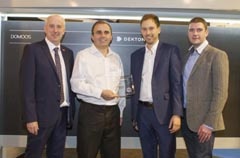Cosentino’s Dekton, its new ultracompact surface, has won the KBB Innovation Award for Kitchens.
Announced live at the show, held in the NEC Birmingham last month (2-5 March), the award was presented to managing director for Cosentino UK and Ireland, Christophe Gontier on the Cosentino stand.
Every exhibitor entered the awards by displaying an innovation swing tag on its most innovative product for the judges to consider. The panel of judges included David Sanders of Blum, Darren Morgan of Designer Kitchen and Paul Rowland of CP Hart. Innovation awards were also presented for bedrooms and bathrooms.
Christophe Gontier said: “We believe that Dekton by Cosentino will revolutionise the kitchen retail and architectural sectors and are thrilled that its innovation has been recognised by the KBB show and its prestigious panel of judges.”
The result of a k128million investment and 22,000 hours of research and development, Dekton is a completely new category of surface. It can be used for both vertical and horizontal surfaces on interiors or exteriors, thanks to its resistance to UV rays and the large format slabs (3.2m x 1.44m) in which it is supplied, which makes it easy and quick to install.
The surface can be used for any of the applications that natural stone has been used – including kitchen worktops, flooring and covering; bathroom floors and wall coverings; furnishings; complete exterior facades, where Dekton covers the walls of a building like a layer of skin; floors and swimming pools.
Dekton is highly resistant to scratches, fire, heat, freezing (and freeze/thaw cycles), stains, abrasion, impact and compression.
It also has low water absorption and high dimensional and colour stability.
Dekton is manufactured in a huge factory at Cosentino’s headquarters in Almeria, Spain, using massive presses and ovens in an advanced process of TSP (technology of sintered particles).
Sintering is a process of atomic diffusion that occurs naturally all the time, but is accelerated by heat and pressure.
The precise details of the Cosentino manufacturing process are kept secret, but the group describes it as an accelerated version of the natural process that nature applies over millions of years to produce natural stone.
Dekton is manufactured with a sophisticated blend of raw materials that are also used to produce glass, porcelain and quartz worktops. These naturally occurring minerals are mixed with a variety of aggregates and water to create Dekton. During the production process, 84% of the water used is evaporated, recycled and reused.
An ultracompaction process removes air from the mixture under a loading of 25,000tons. The slab is then baked at high temperatures, when crystals grow, giving the surface its strength in the same way that crystals give stone its strength. At the point of maximum temperature – 1,200ºC – the entire slab is liquefied, just like the magma found hundreds of kilometers below the earth’s surface. As the temperature drops at the end of firing, the slab solidifies.
Dekton is supplied in four thicknesses – 8mm, 12mm, 20mm and 30mm. And 1,500 slabs can be manufactured each day. The initial range is available in 14 different references, grouped into three collections (Solid, Natural and Tech) in three finishes (polished, matte and slate).
The Cosentino Group behind Dekton is a global but still family-owned company that produces and distributes high value innovative surfaces for architecture and design.
As a leading manufacturer, Cosentino aims to develop, in conjunction with its customers, innovative design solutions. As well as Dekton, its brands include Silestone, Eco by Cosentino and Sensa by Cosentino. These are, respectively, quartz, recycled surfaces, and vacuum impregnated protected natural granites.
The group says it bases its development on international expansion, an innovative research & development programme, respect for the environment and sustainability.
More than 85% of Cosentino Group’s turnover comes from international markets. It currently distributes to more than 60 countries, directly managing its own facilities in 17 of them (including its five depots in the UK).

